早在美国解除封锁之前,远程办公的白领们就已经在放弃位于西雅图和纽约市等地的公寓,搬到奥斯汀、博伊西和拉斯维加斯等地购房。当然,购房者的大量涌入使这些市场的房价暴涨。在拉斯维加斯,疫情期间的房地产市场繁荣使房价上涨了49%。
现在繁荣已经结束。
美国房地产市场正在降温。房屋销量下降,多人抢购一套房子的情况正在减少。房屋建筑商正在缩减规模,并向购房者提供激励。但房地产市场降温最严重的是博伊西和奥斯汀等市场。简而言之:疫情期间房地产市场繁荣的城镇,因为疫情期间的房地产市场下滑受到的冲击最为严重。
约翰伯恩斯房地产咨询公司(John Burns Real Estate Consulting)的研究主管瑞克·帕拉西奥斯二世告诉《财富》杂志:“你可以用强有力的证据证明,过去10%的房价上涨完全是理想性的,是非理性的,并且很快从高点下跌……这正就是我们目前所看的情况。”
帕拉西奥斯表示,近在眼前的房价回调,在博伊西或拉斯维加斯等泡沫化市场的表现将最为突出。事实上,他表示博伊西可能是第一个房价同比下跌的主要市场。这种情况甚至可能在2022年底之前发生。
房屋库存可以说是判断市场调整速度的最佳指标。如果有效库存过高,会增加市场出现房价回调的几率。因此,《财富》杂志汇总了Realtor.com收集的奥斯汀、博伊西和拉斯维加斯的库存数据。我们希望确定这些市场是否正在逐渐转向回调。
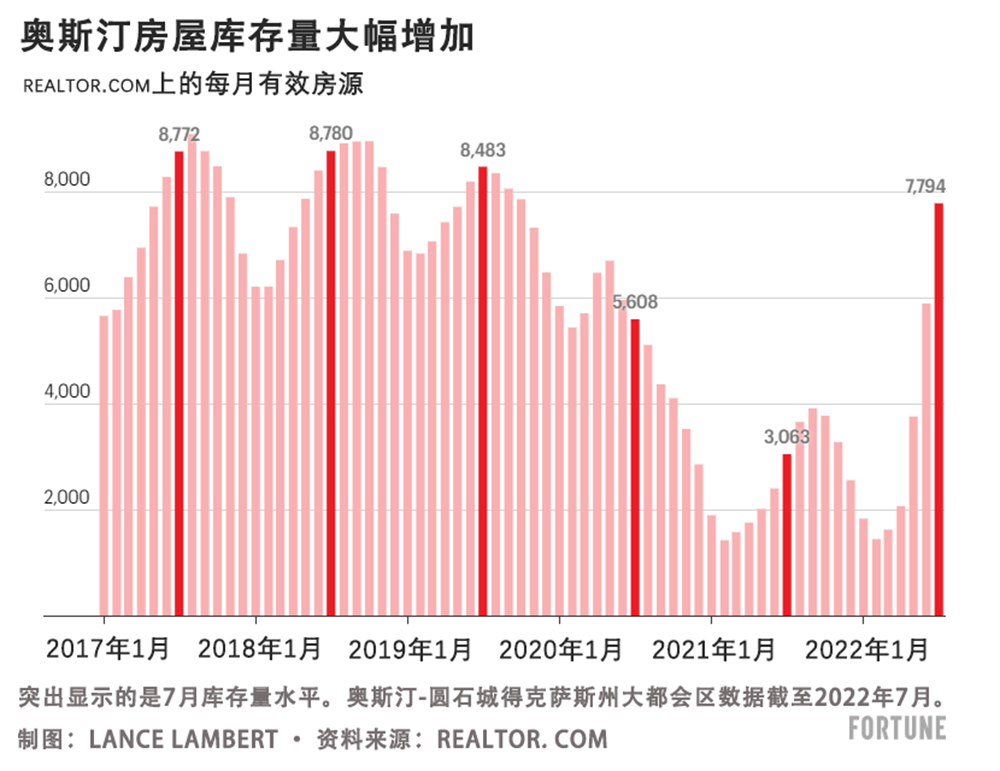
2020年7月,《财富》杂志将奥斯汀评为疫情期间美国最适合投资的房地产市场。我们的理论是奥斯汀市场即将迎来繁荣。这个判断非常准确。
疫情期间,有大量新居民涌入奥斯汀。其中包括喜剧演员乔·罗根、风险投资家基斯·拉博伊斯和特斯拉(Tesla)CEO埃隆·马斯克,特斯拉和甲骨文(Oracle)等公司也搬到了奥斯汀。这使奥斯汀房地产市场迎来了一次历史性的繁荣期。
当然,2022年抵押贷款利率上浮使情况急转直下。7月,奥斯汀房屋库存量为7,794套,而在2021年同期的待售房屋为3,063套。库存量同比增加了154%。
虽然美国的房屋建筑商重新采取激励措施吸引购房人,但奥斯汀的许多建筑商已经开始降价出售。如果市场持续放缓,现有住房可能很快就会开始降价。
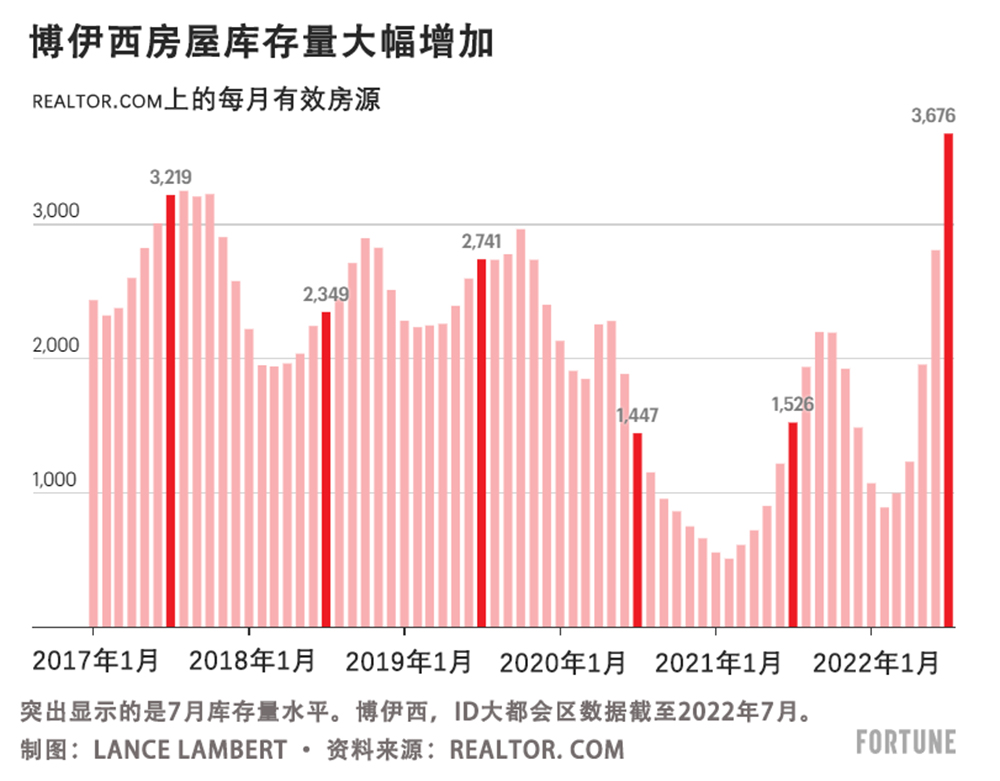
7月,全美房屋库存量较2019年7月低44%。但博伊西市场的情况却截然不同。7月,博伊西房屋库存量比2021年7月高141%,比2019年7月高34%。
房屋库存量的迅速增加,解释了为什么美国许多研究机构预测,博伊西的房价即将下跌。其中包括约翰伯恩斯房地产咨询公司和穆迪分析(Moody's Analytics)。为什么呢?原因之一是博伊西的新建住房供大于求,并且将很快上市。如果没有购房人,这些房屋将给博伊西的房价带来下行压力。
来自博伊西的Sekady Capital公司的高级运营经理迈克·里格利表示:“我们看到[博伊西的]建筑商正在全面减少库存。不同于2018年,这一次许多建筑商并没有措手不及。他们手里有更多现金。他们正在做出让步,清理库存。”
里格利直到今年六月一直在博伊西一家房屋建筑公司担任运营总监。他依旧希望本地建筑商可以清理大量库存,以免出现问题。
里格利表示:“如果市场能放慢新房屋许可发放速度,并吸纳从现在到明年春天积压的已竣工房屋库存,市场将有望趋于正常。我们依旧供应不足,但对于本地购房人而言依旧存在可负担性问题。”
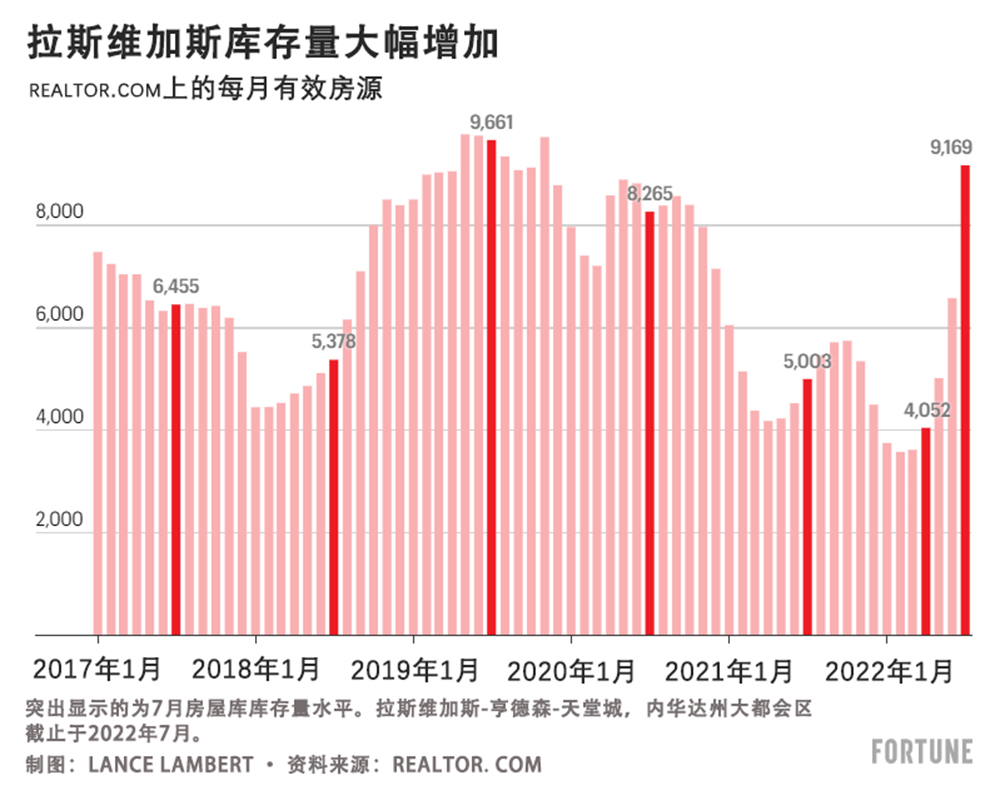
早在2000年代初,美国房地产市场就出现了炒房客。这些炒房客将目标瞄向了拉斯维加斯等位于快速增长的阳光带城市。随着2008年房地产泡沫破灭,这种投机行为对拉斯维加斯造成了反噬。随着房地产市场周期的“推进”,这些炒房客最先撤离了市场。库存量增加必然会给市场带来更大的下行压力。
如今,拉斯维加斯再次成为房地产市场降温的中心:拉斯维加斯的房屋库存量同比增长了83%。拉斯维加斯房地产市场增长放缓的速度,达到了历史最高水平。事实上,拉斯维加斯2022年的降温速度,超过了2008年房地产市场崩溃之前的大多数泡沫市场。
但不要以为拉斯维加斯房地产市场会再次像2008年一样再次崩溃。至少穆迪分析是这样认为。穆迪分析预测,2022年第4季度至2024年第4季度期间,拉斯维加斯的房价将下跌4%。有人可能将这种下跌视为房地产市场回调,而不是市场崩溃。
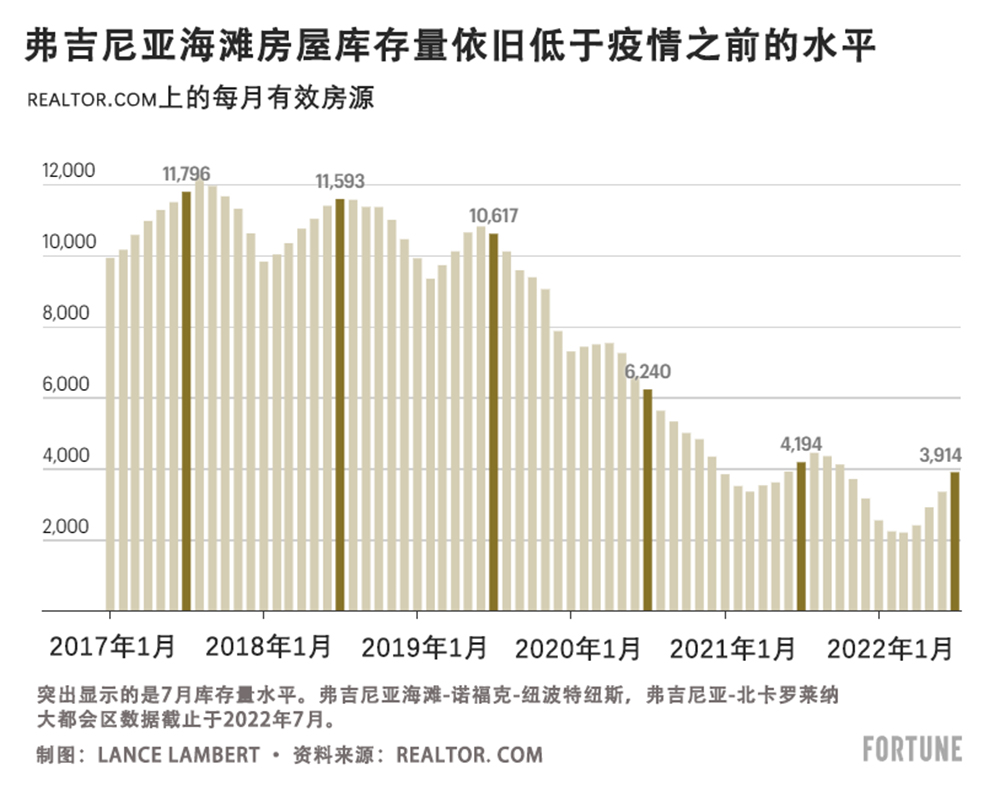
需要说明的是,美国并非所有房地产市场都像博伊西或拉斯维加斯一样正在快速发生转变。虽然各地市场均受到了抵押贷款利率上浮的影响,但疫情期间房地产市场下滑在全美各地的表现不一。
比如弗吉尼亚海滩。弗吉尼亚海滩房屋库存量同比减少了7%。这并不能算是一次快速市场回调。
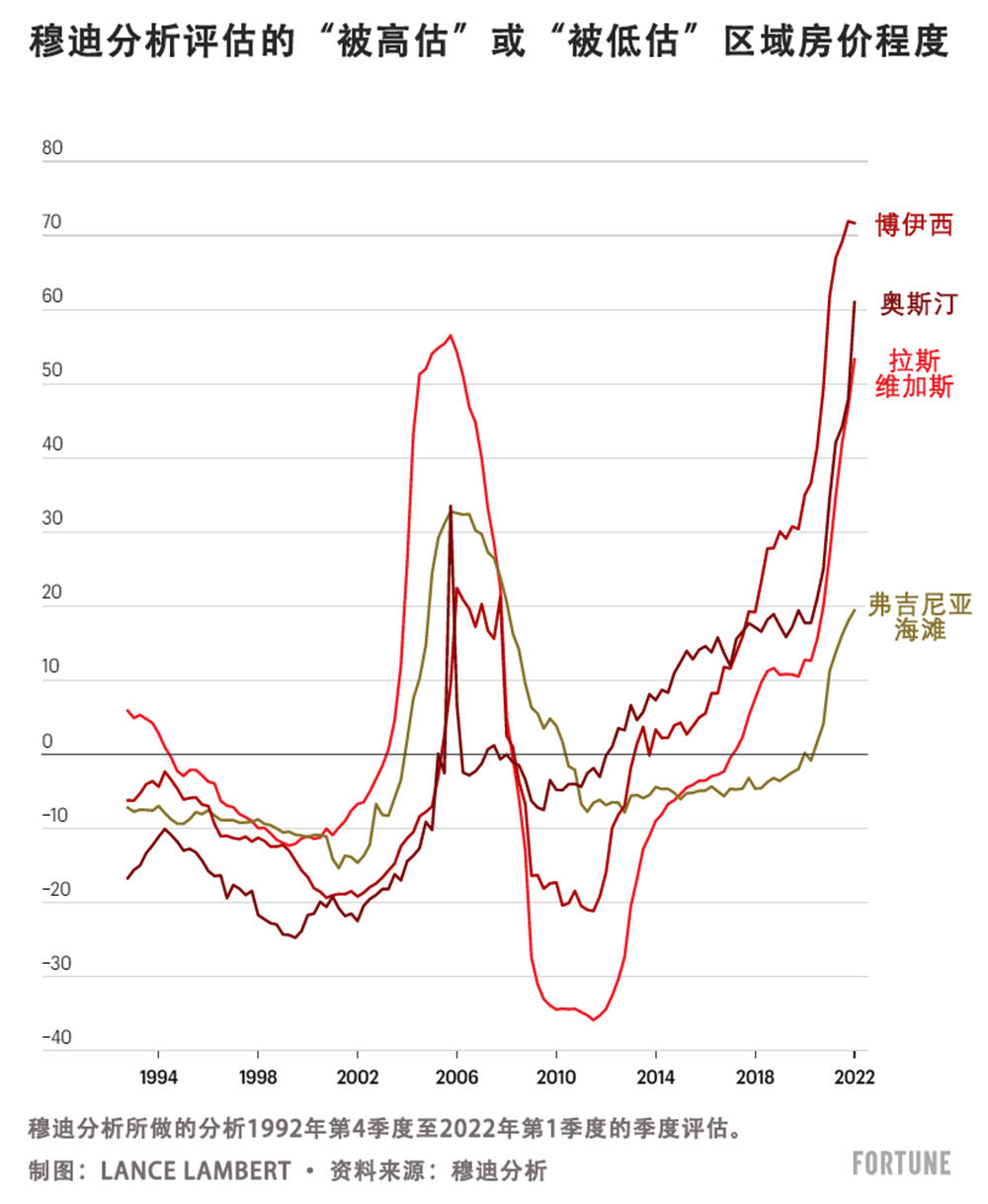
为什么奥斯汀、博伊西和拉斯维加斯等市场会因为房地产市场降温而受到如此严重的影响?这可能源于经济基本面的影响。
疫情期间的房地产市场繁荣使奥斯汀和博伊西的房价大幅上涨,超过了历史上本地收入能够维持的水平。穆迪分析认为,博伊西和奥斯汀房地产市场分别“被高估”了72%和61%。而弗吉尼亚海滩仅“被高估”了19%。
房地产市场相对于经济基本面被高估,并不意味着房价一定会回调。但它非常重要。从历史上来看,当房地产市场周期“推进”时,正常情况下,被严重“高估”的房地产市场,面临房价回调的风险最高。拉斯维加斯等市场的库存量增加,意味着这种情况可能重现。
Freedom Founders公司创始人戴维·费尔普斯表示:“一些市场的房价在两年内上涨了超过40%。在某些时间点,可负担性成了问题。工资上涨速度跟不上总体生活成本上涨的幅度,抵押贷款月供达到了最高点,即使低利率也无济于事。
总之,房价上涨幅度更大的市场也将是房价下跌幅度最大的市场。”Freedom Founders指导人们通过被动房地产投资积累财富。(财富中文网)
译者:刘进龙
审校:汪皓
早在美国解除封锁之前,远程办公的白领们就已经在放弃位于西雅图和纽约市等地的公寓,搬到奥斯汀、博伊西和拉斯维加斯等地购房。当然,购房者的大量涌入使这些市场的房价暴涨。在拉斯维加斯,疫情期间的房地产市场繁荣使房价上涨了49%。
现在繁荣已经结束。
美国房地产市场正在降温。房屋销量下降,多人抢购一套房子的情况正在减少。房屋建筑商正在缩减规模,并向购房者提供激励。但房地产市场降温最严重的是博伊西和奥斯汀等市场。简而言之:疫情期间房地产市场繁荣的城镇,因为疫情期间的房地产市场下滑受到的冲击最为严重。
约翰伯恩斯房地产咨询公司(John Burns Real Estate Consulting)的研究主管瑞克·帕拉西奥斯二世告诉《财富》杂志:“你可以用强有力的证据证明,过去10%的房价上涨完全是理想性的,是非理性的,并且很快从高点下跌……这正就是我们目前所看的情况。”
帕拉西奥斯表示,近在眼前的房价回调,在博伊西或拉斯维加斯等泡沫化市场的表现将最为突出。事实上,他表示博伊西可能是第一个房价同比下跌的主要市场。这种情况甚至可能在2022年底之前发生。
房屋库存可以说是判断市场调整速度的最佳指标。如果有效库存过高,会增加市场出现房价回调的几率。因此,《财富》杂志汇总了Realtor.com收集的奥斯汀、博伊西和拉斯维加斯的库存数据。我们希望确定这些市场是否正在逐渐转向回调。
2020年7月,《财富》杂志将奥斯汀评为疫情期间美国最适合投资的房地产市场。我们的理论是奥斯汀市场即将迎来繁荣。这个判断非常准确。
疫情期间,有大量新居民涌入奥斯汀。其中包括喜剧演员乔·罗根、风险投资家基斯·拉博伊斯和特斯拉(Tesla)CEO埃隆·马斯克,特斯拉和甲骨文(Oracle)等公司也搬到了奥斯汀。这使奥斯汀房地产市场迎来了一次历史性的繁荣期。
当然,2022年抵押贷款利率上浮使情况急转直下。7月,奥斯汀房屋库存量为7,794套,而在2021年同期的待售房屋为3,063套。库存量同比增加了154%。
虽然美国的房屋建筑商重新采取激励措施吸引购房人,但奥斯汀的许多建筑商已经开始降价出售。如果市场持续放缓,现有住房可能很快就会开始降价。
7月,全美房屋库存量较2019年7月低44%。但博伊西市场的情况却截然不同。7月,博伊西房屋库存量比2021年7月高141%,比2019年7月高34%。
房屋库存量的迅速增加,解释了为什么美国许多研究机构预测,博伊西的房价即将下跌。其中包括约翰伯恩斯房地产咨询公司和穆迪分析(Moody's Analytics)。为什么呢?原因之一是博伊西的新建住房供大于求,并且将很快上市。如果没有购房人,这些房屋将给博伊西的房价带来下行压力。
来自博伊西的Sekady Capital公司的高级运营经理迈克·里格利表示:“我们看到[博伊西的]建筑商正在全面减少库存。不同于2018年,这一次许多建筑商并没有措手不及。他们手里有更多现金。他们正在做出让步,清理库存。”
里格利直到今年六月一直在博伊西一家房屋建筑公司担任运营总监。他依旧希望本地建筑商可以清理大量库存,以免出现问题。
里格利表示:“如果市场能放慢新房屋许可发放速度,并吸纳从现在到明年春天积压的已竣工房屋库存,市场将有望趋于正常。我们依旧供应不足,但对于本地购房人而言依旧存在可负担性问题。”
早在2000年代初,美国房地产市场就出现了炒房客。这些炒房客将目标瞄向了拉斯维加斯等位于快速增长的阳光带城市。随着2008年房地产泡沫破灭,这种投机行为对拉斯维加斯造成了反噬。随着房地产市场周期的“推进”,这些炒房客最先撤离了市场。库存量增加必然会给市场带来更大的下行压力。
如今,拉斯维加斯再次成为房地产市场降温的中心:拉斯维加斯的房屋库存量同比增长了83%。拉斯维加斯房地产市场增长放缓的速度,达到了历史最高水平。事实上,拉斯维加斯2022年的降温速度,超过了2008年房地产市场崩溃之前的大多数泡沫市场。
但不要以为拉斯维加斯房地产市场会再次像2008年一样再次崩溃。至少穆迪分析是这样认为。穆迪分析预测,2022年第4季度至2024年第4季度期间,拉斯维加斯的房价将下跌4%。有人可能将这种下跌视为房地产市场回调,而不是市场崩溃。
需要说明的是,美国并非所有房地产市场都像博伊西或拉斯维加斯一样正在快速发生转变。虽然各地市场均受到了抵押贷款利率上浮的影响,但疫情期间房地产市场下滑在全美各地的表现不一。
比如弗吉尼亚海滩。弗吉尼亚海滩房屋库存量同比减少了7%。这并不能算是一次快速市场回调。
为什么奥斯汀、博伊西和拉斯维加斯等市场会因为房地产市场降温而受到如此严重的影响?这可能源于经济基本面的影响。
疫情期间的房地产市场繁荣使奥斯汀和博伊西的房价大幅上涨,超过了历史上本地收入能够维持的水平。穆迪分析认为,博伊西和奥斯汀房地产市场分别“被高估”了72%和61%。而弗吉尼亚海滩仅“被高估”了19%。
房地产市场相对于经济基本面被高估,并不意味着房价一定会回调。但它非常重要。从历史上来看,当房地产市场周期“推进”时,正常情况下,被严重“高估”的房地产市场,面临房价回调的风险最高。拉斯维加斯等市场的库存量增加,意味着这种情况可能重现。
Freedom Founders公司创始人戴维·费尔普斯表示:“一些市场的房价在两年内上涨了超过40%。在某些时间点,可负担性成了问题。工资上涨速度跟不上总体生活成本上涨的幅度,抵押贷款月供达到了最高点,即使低利率也无济于事。
总之,房价上涨幅度更大的市场也将是房价下跌幅度最大的市场。”Freedom Founders指导人们通过被动房地产投资积累财富。(财富中文网)
译者:刘进龙
审校:汪皓
Even before the lockdowns were eased, white-collar professionals who saw their jobs go remote were ditching their apartments in places like Seattle and New York City for homes in markets like Austin, Boise, and Las Vegas. That rush of homebuyer activity, of course, saw home prices absolutely skyrocket in those markets. In Las Vegas alone, the Pandemic Housing Boom pushed home prices up 49%.
That boom is over now.
Across the country, housing markets are cooling down. Home sales are falling. Multiple offers are drying up. Homebuilders are scaling back and offering buyer incentives. But every aspect of the cooldown is more intense in markets like Boise and Austin. Simply put: Pandemic boomtowns are getting hit the hardest by the Pandemic Housing Slump.
“You could make a strong case that in a lot of housing markets the last 10% of home price appreciation was purely aspirational and irrational, and that’ll come off the top really fast…That’s exactly what we’re all seeing right now,” Rick Palacios Jr., head of research at John Burns Real Estate Consulting, tells Fortune.
This looming home price correction, Palacios says, will be the most pronounced in frothy markets like Boise and Las Vegas. In fact, he says Boise could be the first major market to post a year-over-year home price decline. That could even occur before the end of 2022.
Inventory is arguably the best indicator for how fast a market is shifting. If active inventory gets too high, it increases the chances a market could experience a home price correction. That’s why Fortune pulled Realtor.com inventory data for Austin, Boise, and Las Vegas. We wanted to see if they’re actually inching toward a correction.
In July 2020, Fortune called Austin the No. 1 housing market in the country to invest in real estate during the pandemic. Our theory was that Austin was poised to boom. We were right.
Amid the pandemic, Austin saw a flood of new residents. That includes individuals like comedian Joe Rogan, venture capitalist Keith Rabois, and Tesla CEO Elon Musk, while companies including Tesla and Oracle also moved to town. It all culminated in a historic housing boom.
Spiked mortgage rates in 2022, of course, have flipped the script. In July, Austin inventory sat at 7,794 homes—compared to 3,063 homes for sale during the same month in 2021. On a year-over-year basis, that’s a 154% jump.
While homebuilders across the country have brought back incentives to help entice buyers, many builders in Austin have already turned to home price cuts. If the market continues to slow, existing homes could soon also see price cuts.
Nationally, U.S. inventory in July was 44% below where it was in July 2019. That's not the case in Boise. In July, Boise inventory was 141% above July 2021 levels, and 34% above July 2019 levels.
The swift inventory spike explains why there's no shortage of national research firms predicting that home prices are about to fall in Boise. That includes both John Burns Real Estate Consulting and Moody's Analytics. One reason? There's a glut of new construction in Boise that will soon hit the market. If buyers aren't found, those homes could put downward pressure on Boise home prices.
"We’re seeing [Boise] builders pull back across the board. Unlike 2008, many aren’t being caught as off guard this time. They have more cash. They’re making concessions and moving inventory," says Mac Wrigley, a senior operations manager at Boise-based Sekady Capital.
Wrigley, who up until June was a director of operations at a Boise homebuilder, remains hopeful that local builders can off-load a lot of this inventory before it becomes an issue.
"If the market can slow new permits, and absorb the backlog of completions finishing now through spring, there is optimism the market will normalize. We’re still under-supplied, but also still have an affordability problem for local buyers," Wrigley says.
Back in the early 2000s, housing speculators piled into the U.S. housing market. Those investors, who were often home flippers, targeted fast-growing Sunbelt cities like Las Vegas. That speculation ultimately worked against Las Vegas once the housing bubble popped in 2008. See, as the housing cycle "rolled over," those investors were the first to run for the exits. That pileup of inventory, of course, only put further downward pressure on the market.
Fast-forward to today, and Las Vegas is once again at the center of a cooling housing market: On a year-over-year basis, inventory in Las Vegas is up 83%. Not only is Las Vegas slowing fast, it's slowing historically fast. In fact, its 2022 cooldown is swifter than the cooldown most bubbly markets notched in the lead-up to the 2008 crash.
But don't pencil in another 2008-style Las Vegas housing crash. At least that's according to Moody's Analytics. The firm predicts house prices in Las Vegas are poised to fall 4% between the fourth quarter of 2022 and the fourth quarter of 2024. While some might classify that as a housing correction, it's hardly a crash.
Let's be clear: Not every U.S. housing market is shifting as fast as Boise or Las Vegas. While spiked mortgage rates hit evenly across the country, the Pandemic Housing Slump has not.
Look no further than Virginia Beach. On a year-over-year basis, inventory in Virginia Beach is down 7%. That's hardly a swift correction.
Why are housing markets in Austin, Boise, and Las Vegas getting hit so hard by the housing cooldown? It's likely a result of detached underlying economic fundamentals.
The Pandemic Housing Boom has pushed home prices in markets like Austin and Boise far beyond what local incomes would historically support. According to Moody's Analytics, Boise and Austin are "overvalued" by 72% and 61%, respectively. Meanwhile, Virginia Beach is "overvalued" by just 19%.
Simply being overvalued relative to underlying economic fundamentals doesn't guarantee a home price correction. But it does matter. Historically speaking, when a housing cycle "rolls over," it's normally the significantly "overvalued" housing markets that are at the highest risk of home price corrections. The inventory spikes in markets like Las Vegas suggest that may once again hold true.
"In some markets, house prices rose over 40% in just two years. At some point, affordability becomes an issue. Wages have not kept up with the higher overall costs of living, and there is a ceiling to the higher monthly mortgage payments that even low-interest rates could not appease," says David Phelps, founder of Freedom Founders, where he coaches people on how to build wealth through passive real estate investments.
"In general, those markets that reported higher levels of price appreciation will be those that demonstrate greater price contraction."






